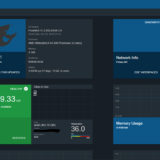WordPress Plugin: wp-server-migration
This plugin is designed to make managing migration from dev->staging->production easier for WordPress and WordPress Multisite. Allows for WP_HOME and WP_SITEURL to be set in WordPress Multisite, and for URLs in content and meta data to be rewritten automatically when the environment changes.
This file is always up to date based on this gist.
wp-server-migration.php
<?php
/*
Plugin Name: Wordpress Hostname Migration
Plugin URI: http://doublesharp.com/
Description: Functionality to ease in migration of Wordpress code and databases between environments.
Author: Justin Silver
Version: 1.0
Author URI: http://doublesharp.com
License: GPL2
*/
if ( ! class_exists( 'WordpressMigration' ) ):
class WordpressMigration {
// token used to replace site URLs, overridden with SITE_URL_TOKEN constant
private static $site_url_token = '%%site_url_token%%';
private static $instance;
private function __construct() { }
public static function init() {
if ( ! self::$instance ) {
self::$instance = new WordpressMigration();
// Multisite only filters
if ( defined( 'WP_DEVELOPMENT ') && WP_DEVELOPMENT && is_multisite() ):
self::$instance->set_multisite_hooks();
endif;
// Content create url token
self::$instance->set_content_update_hooks();
// Content replace url token
self::$instance->set_content_fetch_hooks();
// MetaData create url token
self::$instance->set_meta_update_hooks();
// MetaData replace url token
self::$instance->set_meta_fetch_hooks();
}
}
/**
* Hooks that are only needed on multisite
*/
function set_multisite_hooks() {
// _config_wp_siteurl() and _config_wp_home() are used by default but disabled for multisite
add_filter( 'option_siteurl', array( &$this, '_ms_config_wp_siteurl' ), 10, 1 );
add_filter( 'option_home', array( &$this, '_ms_config_wp_home' ), 10, 1 );
add_filter( 'content_url', array( &$this, '_ms_content_url' ), 10, 2 );
add_filter( 'plugins_url', array( &$this, '_ms_plugins_url' ), 10, 3 );
}
/**
* Set the filters that replace the token with the site URL in the content and comments
*/
function set_content_fetch_hooks() {
// Post Content
add_filter( 'the_content', array( &$this, '_content_url_replace_token' ), 11, 1 );
add_filter( 'the_excerpt', array( &$this, '_content_url_replace_token' ), 11, 1 );
add_filter( 'content_edit_pre', array( &$this, '_content_url_replace_token' ), 11, 1 );
add_filter( 'the_editor_content', array( &$this, '_content_url_replace_token' ), 11, 1 );
// Post Comments
add_filter( 'comment_excerpt ', array( &$this, '_content_url_replace_token' ), 11, 1 );
add_filter( 'comment_text', array( &$this, '_content_url_replace_token' ), 11, 1 );
}
/**
* Set the filters that replace the site URL with the token in the content
*/
function set_content_update_hooks() {
// Post Content
add_filter( 'content_save_pre', array( &$this, '_content_url_create_token' ), 11, 1 );
// Post Comments
add_filter( 'comment_save_pre', array( &$this, '_content_url_create_token' ), 11, 1 );
}
/**
* Set the filters that replace the token with the site URL in post, user and comment meta values
*/
function set_meta_fetch_hooks() {
add_filter( 'get_post_metadata', array( &$this, '_get_post_metadata' ), 11, 4 );
add_filter( 'get_user_metadata', array( &$this, '_get_user_metadata' ), 11, 4 );
add_filter( 'get_comment_metadata', array( &$this, '_get_comment_metadata' ), 11, 4 );
}
/**
* Unset the filters that replace the token with the site URL in post, user and comment meta values
*/
function unset_meta_fetch_hooks() {
remove_filter( 'get_post_metadata', array( &$this, '_get_post_metadata' ), 11, 4 );
remove_filter( 'get_user_metadata', array( &$this, '_get_user_metadata' ), 11, 4 );
remove_filter( 'get_comment_metadata', array( &$this, '_get_comment_metadata' ), 11, 4 );
}
/**
* Set the actions that replace the site URL with the token in post, user and comment meta values
*/
function set_meta_update_hooks() {
add_action( 'updated_post_meta', array( &$this, '_updated_post_meta' ), 11, 4 );
add_action( 'updated_comment_meta', array( &$this, '_updated_comment_meta' ), 11, 4 );
add_action( 'updated_user_meta', array( &$this, '_updated_user_meta' ), 11, 4 );
add_action( 'added_post_meta', array( &$this, '_updated_post_meta' ), 11, 4 );
add_action( 'added_comment_meta', array( &$this, '_updated_comment_meta' ), 11, 4 );
add_action( 'added_user_meta', array( &$this, '_updated_user_meta' ), 11, 4 );
}
/**
* Unset the actions that replace the site URL with the token in post, user and comment meta values.
* Primarily used to prevent loops when replacing the url and updating the value.
*/
function unset_meta_update_hooks() {
remove_action( 'updated_post_meta', array( &$this, '_updated_post_meta' ), 11, 4 );
remove_action( 'updated_comment_meta', array( &$this, '_updated_comment_meta' ), 11, 4 );
remove_action( 'updated_user_meta', array( &$this, '_updated_user_meta' ), 11, 4 );
remove_action( 'added_post_meta', array( &$this, '_updated_post_meta' ), 11, 4 );
remove_action( 'added_comment_meta', array( &$this, '_updated_comment_meta' ), 11, 4 );
remove_action( 'added_user_meta', array( &$this, '_updated_user_meta' ), 11, 4 );
}
/**
* Replace this site's WP_SITEURL URL based on constant values
*
* @param string $url - The original URL
* @return string - The replaced URL if overridden in wp-config.php
*/
function _ms_config_wp_siteurl( $url = '' ) {
if ( is_multisite() ):
global $blog_id, $current_site;
$cur_blog_id = defined( 'BLOG_ID_CURRENT_SITE' )? BLOG_ID_CURRENT_SITE : 1;
$key = ( $blog_id != $cur_blog_id )? "{$blog_id}_" : '';
$constant = "WP_{$key}SITEURL";
if ( defined( $constant ) )
return untrailingslashit( constant( $constant ) );
endif;
return $url;
}
/**
* Replace this site's WP_HOME URL based on constant values
*
* @param string $url - The original URL
* @return string - The replaced URL if overridden in wp-config.php
*/
function _ms_config_wp_home( $url = '' ) {
if ( is_multisite() ):
global $blog_id;
$cur_blog_id = defined( 'BLOG_ID_CURRENT_SITE' )? BLOG_ID_CURRENT_SITE : 1;
$key = ( $blog_id != $cur_blog_id )? "{$blog_id}_" : '';
$constant = "WP_{$key}HOME";
if ( defined( $constant ) )
return untrailingslashit( constant( $constant ) );
endif;
return $url;
}
function _ms_content_url($url, $path){
if ( is_multisite() ):
// just swap out the host
$url_array = explode( "/", $url );
$replaced = explode( "/", $this->_ms_config_wp_siteurl() );
$url_array[2] = $replaced[2];
$url = implode( "/", $url_array );
endif;
return $url;
}
function _ms_plugins_url($url, $path, $plugin){
if ( is_multisite() ):
// just swap out the host
$url_array = explode( "/", $url );
$replaced = explode( "/", $this->_ms_config_wp_siteurl() );
$url_array[2] = $replaced[2];
$url = implode( "/", $url_array );
endif;
return $url;
}
/**
* Get the URL Token for this site
*
* @return string - The URL token for this site
*/
function _ms_get_site_url_token() {
if ( defined( 'SITE_URL_TOKEN' ) ) return SITE_URL_TOKEN;
return self::$site_url_token;
}
/**
* Find instances of the current domain and replace them with a token
*
* @param string $content - The orignal content
* @return string - The updated content with the token replacement in place of the site URL
*/
function _content_url_create_token( $content ) {
$domain = get_bloginfo( 'url' );
$token = $this->_ms_get_site_url_token();
// Find instances of the current domain and replace them with the token
$content = str_replace( $domain, $token, $content );
return $content;
}
/**
* Find instances of the token and replace them with the current domain
*
* @param string $content - The orignal content
* @return string - The updated content with the site URL in place of the token
*/
function _content_url_replace_token( $content ) {
$domain = get_bloginfo( 'url' );
$token = $this->_ms_get_site_url_token();
// Find instances of the token and replace them with the current domain
$content = str_replace( $token, $domain, $content );
// case insensitive using preg_replace, may be useful?
//$content = preg_replace('/'.str_replace("/", "\/", $domain).'/i', $token, $content);
return $content;
}
/**
* Hook to get_post_metadata
*
* @param null $metadata - always null
* @param int $object_id - database id of this post object
* @param string $meta_key - The meta key used for lookup on this post id
* @param bool $single - If the value is an array, return the first element, otherwise just the value
* @return mixed - The updated value with the site URL in place of the token
*/
public function _get_post_metadata( $metadata, $object_id, $meta_key, $single ) {
return $this->_get_metadata( 'post', $metadata, $object_id, $meta_key, $single );
}
/**
* Hook to get_user_metadata
*
* @param null $metadata - always null
* @param int $object_id - database id of this user object
* @param string $meta_key - The meta key used for lookup on this user id
* @param bool $single - If the value is an array, return the first element, otherwise just the value
* @return mixed - The updated value with the site URL in place of the token
*/
public function _get_user_metadata( $metadata, $object_id, $meta_key, $single ) {
return $this->_get_metadata( 'user', $metadata, $object_id, $meta_key, $single );
}
/**
* Hook to get_comment_metadata
*
* @param null $metadata - always null
* @param int $object_id - database id of this comment object
* @param string $meta_key - The meta key used for lookup on this comment id
* @param bool $single - If the value is an array, return the first element, otherwise just the value
* @return mixed - The updated value with the site URL in place of the token
*/
public function _get_comment_metadata( $metadata, $object_id, $meta_key, $single ) {
return $this->_get_metadata( 'comment', $metadata, $object_id, $meta_key, $single );
}
/**
* This function is called by the hooked functions and will return the data with the token replaced by the site url
*
* @param string $meta_type - The object type of his meta key/value
* @param null $metadata - always null
* @param int $object_id - database id of this object
* @param string $meta_key - The meta key used for lookup on this id
* @param bool $single - If the value is an array, return the first element, otherwise just the value
* @return mixed - The updated value with the site URL in place of the token
*/
private function _get_metadata( $meta_type, $metadata, $object_id, $meta_key, $single ) {
// Unset the hooks to get the default data
$this->unset_meta_fetch_hooks();
// Fetch the default data
$data = get_metadata( $meta_type, $object_id, $meta_key, $single );
// Reset the hooks to intercept
$this->set_meta_fetch_hooks();
return $data;
// Create a small cache key that is based on the data value (cleared in update code as needed)
$key = $meta_type.$object_id.$meta_key.$single;
// Check to see if we have already processed this value
if ( false === ( $cached = wp_cache_get( $key, 'wordpress_migration' ) ) ) {
$cached = $data;
$domain = get_bloginfo( 'url' );
$token = $this->_ms_get_site_url_token();
$hastoken = false;
// Check for the token and replace it with the url
if ( is_array( $cached ) ) {
foreach ( $cached as $value ) {
// Only process strings for now
if ( is_string( $value ) && false !== strpos( $value, $token ) ) {
// Value contains token
$value = str_replace( $token, $domain, $value );
$hastoken = true;
}
}
} else {
if ( false !== strpos( $cached, $token ) ) {
// Value contains token
$cached = str_replace( $token, $domain, $cached );
$hastoken = true;
}
}
// If we didn't replace the token just show that it has been processed.
if ( ! $hastoken ) $cached = true;
// Set the cache so we don't have to loop/replace
wp_cache_set( $key, $cached, 'wordpress_migration', 600 ); // 5 mins
}
// It has been processed, but did not have the token, return $data
if ( $cached !== true ) {
$data = $cached;
}
return $data;
}
/**
* Hook to updated_post_meta
*
* @param int $meta_id - Database id of the meta key/value
* @param int $object_id - Database id of this post object
* @param string $meta_key - The meta key used for update on this post id
* @param mixed $_meta_value - The current meta value
*/
public function _updated_post_meta( $meta_id, $object_id, $meta_key, $_meta_value ) {
$this->_updated_meta( 'post', $meta_id, $object_id, $meta_key, $_meta_value );
}
/**
* Hook to updated_comment_meta
*
* @param int $meta_id - Database id of the meta key/value
* @param int $object_id - Database id of this comment object
* @param string $meta_key - The meta key used for update on this comment id
* @param mixed $_meta_value - The current meta value
*/
public function _updated_comment_meta( $meta_id, $object_id, $meta_key, $_meta_value ) {
$this->_updated_meta( 'comment', $meta_id, $object_id, $meta_key, $_meta_value );
}
/**
* Hook to updated_user_meta
*
* @param int $meta_id - Database id of the meta key/value
* @param int $object_id - Database id of this user object
* @param string $meta_key - The meta key used for update on this user id
* @param mixed $_meta_value - The current meta value
*/
public function _updated_user_meta( $meta_id, $object_id, $meta_key, $_meta_value ) {
$this->_updated_meta( 'user', $meta_id, $object_id, $meta_key, $_meta_value );
}
/**
* Called by hooked functions with the meta type. Checks the values for the site url, replaces
* with the token, and updates the meta_value if necessary.
*
* @param string $meta_type - The object type of his meta key/value
* @param int $meta_id - Database id of the meta key/value
* @param int $object_id - Database id of this object
* @param string $meta_key - The meta key used for update on this object id
* @param mixed $_meta_value - The current meta value
*/
private function _updated_meta( $meta_type, $meta_id, $object_id, $meta_key, $_meta_value ) {
$domain = get_bloginfo( 'url' );
$token = $this->_ms_get_site_url_token();
// Only update the meta value if we find an instance of the url
$update = false;
$meta_value = $_meta_value;
if ( is_array( $meta_value ) ) {
// Loop through the array and update the values
foreach ( $meta_value as &$value ) {
// only check if this is a string, don't support arrays of arrays
if ( is_string( $value ) && false!==strpos( $value, $domain ) ) {
$value = str_replace( $domain, $token, $value );
$update = true;
}
}
} else {
// Check meta value for url
if ( false!==strpos( $meta_value, $domain ) ) {
$meta_value = str_replace( $domain, $token, $meta_value );
$update = true;
}
}
// The meta value contained a url which was replaced with a token
if ( $update ) {
// Unset the update hooks to prevent a loop
$this->unset_meta_update_hooks();
// Update the meta value
update_metadata( $meta_type, $object_id, $meta_key, $meta_value, $_meta_value );
// Reset the hooks
$this->set_meta_update_hooks();
}
// Since the value was updated, clear the cache
$key = $meta_type.$object_id.$meta_key;
wp_cache_delete( $key.true, 'wordpress_migration' ); // single = true
wp_cache_delete( $key.false, 'wordpress_migration' ); // single = false
}
}
// init the class/filters
WordpressMigration::init();
endif; // class exists


































I got to messing around with it for a few hours. It looks like there causing an infinite redirect loop upon removing/changing the wp_blog and wp_site tables. As soon as its activate on the network (Multisite) it logs you out and doesn’t allow you to log back in again. I tried about a half dozen things but nothing seems to get this working. Perhaps there are some steps I’m missing with what to change or remove from the DB or wp-config.php?
Hi! This plugin should work with the type of setup you described, however I haven’t actually used it in quite some time so I’m not sure if it is compatible with the latest versions of WordPress. This plugin was meant to help with development by quickly rewriting the hostnames for the content, so it may not be entirely necessary for what you are trying to accomplish.
This site actually handles good amount of traffic using: WordPress, PHP-FPM, Nginx, MariaDB, CentOS, Redis via Cloudflare and a custom Redis page caching plugin that I wrote. If a user is not logged in the entire page HTML is pulled from the Redis cache in about 1/1000th of a second assuming it’s cached. Hard refreshes hit the server but I also use a Redis Object cache to reduce database queries.
I’m pretty busy with other projects right now but I’ll try to revisit this plugin to make sure it still works when I have more time.
Thanks!
This is fantastic. We are considering trying this out for our Tile Store Showroom site with a cookie-less domain.
We currently have a cPanel shared hosting account that we primarily use for email, but have recently decided to try it out as a CDN as well. We serve the static files off the shared hosting account while all the DB and PHP action happens on a cheap cloud VPS VM.
The shared host has barely broken a sweat from serving static files (Apache only for the shared host) and the cloud VM is getting taxed a bit from the database. We had to tune the DB to only allow for 30 connections at once and we finally saw that maxed out the other day for the first time. We tweaked on some Cloudflare settings and boosted the page speed way WAY up, but there is now a security cookie with every request due to Cloudflares security cookie.
We’d like to keep growing but since we don’t derive our revenue from our website, we keep a tight budget for our technology investments. We were considering using HAproxy as a load balancing solution to add a 3rd server from an in-house “roll your own” server. Not only will this plugin help IMMENSELY with switching between environments but we think we could use this to tap into the shared host account’s unused PostgreSQL and MySQL DB’s by allowing for unique wp-config.php settings on each server machine having its own ‘localhost’ DB.
Before we make any decisions, is this something that you think would fly with enough configuration of this awesome plugin? Having a load balancer pitching traffic to different servers and unique configurations with the same WordPress code and files, all with their own unique databases by excluding any DB tables that cause machine specific issues, yet with the same actual page content is what we are going for…